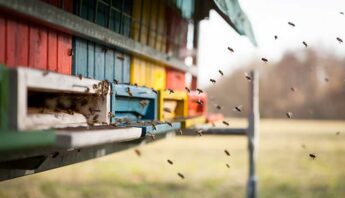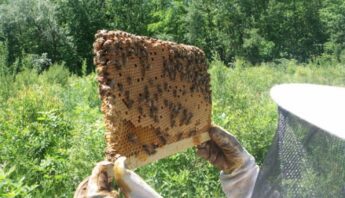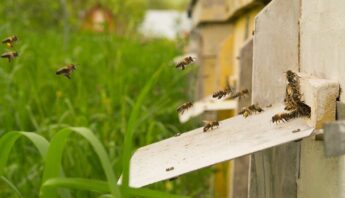Long before legislators filed back to the Minnesota Capitol this spring, political analysts were predicting that not much progress would be made in this year’s legislative session. With split control of the legislature and a short eleven weeks to get their work done, folks across the political spectrum anticipated gridlock. So as the dust settles after the end of session this week, how did things shake out for food and pesticide policy here in Minnesota?
No surprise, the session had its share of ups and downs overall.
Advocates for robust and sustainable transportation systems, racial justice and statewide infrastructure called out all the unfinished business our legislators left undone as session closed this week. Those of us who work to build a more just and sustainable food system saw some important progress, some big disappointments, and — perhaps most importantly — encouraging momentum to hold our decisionmakers accountable to local communities.
Pollinator protection in fits & starts
Minnesotans are fired up to protect pollinators — on their farms, in their gardens and bee yards, and in local communities. The state has passed a few important policies in recent years, but decisionmakers have a ways to go to truly protect pollinators from harmful pesticides.
This year, PAN and our partners worked on a “pollinator-friendly farming” bill that would offer grants to farmers who transition away from using bee-harming neonicotinoids (neonics), and create pollinator habitat in their fields. Since the vast majority of the corn and soybean seed available to farmers is coated with neonics — even when these pesticides are not needed in the field — it’s going to take policy change to give farmers more seed options and reduce neonic use. Our bill aimed to do just that.
We made good progress. Two Senate committees heard supportive testimony from conventional and organic farmers, beekeepers and pollinator experts. The legislation sailed through both committees with bipartisan support. Unfortunately, in spite of our strong advocacy legislators in the House didn’t make the bill a priority, and as the House and Senate negotiated their final omnibus bill, our legislation didn’t make the cut.
Our bee-friendly farming bill wasn’t the only policy in motion for pollinators. Pollinator champions also introduced several amendments that would keep neonics off public lands in Minnesota, as U.S. Fish and Wildlife Service has done on their wildlife refuges nationwide. While these amendments didn’t pass, they’re an important model for both future legislation and regulatory action. The legislature also authorized new funding to create habitat for pollinators along state roadsides.
Since I started working on this issue, more legislation focused on pollinators has been introduced every year. Why? Minnesota legislators know that voters are concerned about bee declines, and that those constituents expect action.
This is good news. But as pollinators continue to take center stage at the Capitol, they also continue to die-off at unprecedented rates. We need to keep pushing elected officials who call themselves pollinator champions to tackle the pesticide problem head-on. Those decisionmakers who greenlight new pollinator habitat projects but fight to keep bee-harming pesticides on the market? They’re missing a key part of the problem.
Pineland Sands
As I wrote back in February, PAN has raised concerns about potato giant RD Offutt’s plans to expand its fields into the Pineland Sands aquifer. With our partners at Toxic Taters, White Earth Land Recovery Project and Land Stewardship Project, we’ve called for regulatory agencies to put local communities first — instead of bending to the undue influence of one of the largest corporate actors in our food system.
In spite of local opposition, RDO and the Minnesota Department of Natural Resources requested $1.5 million from the legislature to fund a special study on the proposed expansion. Local community members voiced concerns that the study has been shaped by RDO and undermines public processes that are already in place to review projects like this one. They don’t want the expansion to move forward, and they certainly don’t want our regulatory agencies paving the way.
In the last hours of the session, legislators granted the Pineland Sands Land and Water study the full $1.5 million requested. We were disappointed that the flawed study was funded, but the work is far from over. While the study will move forward as planned, we’ll continue to work with Toxic Taters and local residents to make sure that community voices aren’t cut out — yet again — from shaping the process.
Getting to good policy
At PAN, we work for policies that promote a just, sustainable food system. And we know that the only way to create good policy is to have a sound process, with those communities affected by pesticides at the center from the start.
Unfortunately, this isn’t the norm. Too often, it’s pesticide companies — not rural and farm communities — who are setting the terms of the debate. This session I watched lobbyists for the pesticide industry swoop in to put behind-the-scenes pressure on legislators to derail critical protections for pollinators. I strategized with local community members who wanted to speak up about the Pineland Sands study but were excluded from the agenda when it was discussed – even though RDO was invited to speak.
But I also saw farmers, beekeepers and rural residents drive long distances to make their voices heard at the Capitol. I heard from legislative leaders that they’d been overwhelmed by phone calls and emails about pesticides, pollinators, or the Pineland Sands — and had reconsidered their position. At a meeting about pesticides in central Minnesota, I heard an emerging activist who lives near a potato field say: “I’m willing to call anyone, or drive to St. Paul anytime, to get politicians to pay attention to this problem.” This kind of determination goes a long way.
Every legislative seat in Minnesota will be up in the 2016 election. No matter what happens in November, the landscape will shift, and PAN and our partners will face different barriers and opportunities. But in the long run, we know what we need to do: work alongside farmers, farmworkers, rural and Native communities — those hit hardest by our food system’s reliance on pesticides — to amplify their power, their voices and their visions for a better food and farming system. Long after our legislators leave for summer break and the Capitol goes quiet again, this is the work that needs to be done. And we plan to keep on doing it.








